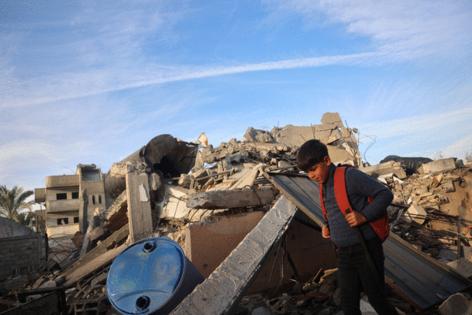Israel, Hamas trade accusations for delaying Gaza ceasefire deal
Published in News & Features
Israel and Hamas accused one another of delaying a Gaza ceasefire aimed at exchanging hostages for prisoners and sending aid to the beleaguered Palestinian territory.
While officials say an agreement for a six-week pause in fighting is still likely soon, frequent past failures to get a deal finalized have left everyone cautious and saying nothing can be taken for granted.
A truce announcement was planned for late on Tuesday if the final talks had been wrapped up in time, but there was always a high chance it would be pushed back, according to two officials following the negotiations. Several Israeli media outlets reported similar information.
One Israeli official familiar with the matter said the delay was down to Hamas adding more prisoners to the list of those to be released. Qatari newspaper al-Araby al-Jadeed quoted a Palestinian official saying Israel had included extra hostages at the last minute. People familiar with the matter on both sides denied the allegations.
Some Israeli newspapers reported that Hamas said Israel hadn’t provided enough information about where its troops would relocate to, though the government denied that.
Israel’s top-selling newspaper ran a front-page story on Wednesday with the headline: “Between Hours and Days.” That summed up the nation’s mood as Israelis wait for a deal most hope will end more than 15 months of war and free all the roughly 98 hostages, of which about half are believed to still be alive.
“The negotiations are continuing,” a spokesperson for Prime Minister Benjamin Netanyahu said on Wednesday morning.
The deal is supposed to lead to Israeli troops leaving populated areas and allow for truckloads of aid to enter Gaza, helping the hundreds of thousands of people living in tents and struggling through the winter.
Haaretz, an Israeli newspaper, reported continuing divisions within Hamas, designated a terrorist organization by the U.S. and many other countries, over whether to accept the latest terms.
The talks, brokered by the U.S. — with officials from both the outgoing Biden and incoming Trump administrations involved — as well as Qatar and Egypt, are taking place in the Qatari capital of Doha.
The sides are discussing a hiatus to allow for the exchanges of people and a boost in aid to Gaza. During the truce, Israel and Hamas will start a second, more serious round of indirect negotiations about ending the war and rebuilding the territory.
The war began in October 2023 when thousands of Hamas operatives crossed into Israel, killing 1,200 people and kidnapping 250 others. Israel responded with an assault that has killed more than 46,000 people, according to the Hamas-run health ministry in Gaza, reduced much of the area to rubble and displaced almost all its roughly 2 million inhabitants.
The fighting brought in anti-Israel militias in Lebanon, Syria and Yemen, threatening a regional conflagration that appears to have so far been prevented. The U.S. says a ceasefire in Gaza will calm the Middle East and ensure a wider war doesn’t erupt.
Israel wants to destroy Hamas as a military and governing organization, while Hamas wants to drive Israeli troops out of Gaza. Squaring that circle has been the main challenge in the ceasefire negotiations.
-------
With assistance from Fiona MacDonald.
©2025 Bloomberg L.P. Visit bloomberg.com. Distributed by Tribune Content Agency, LLC.







Comments